355 Search Results for assessment
December 11, 2012
by Carole Zangari -
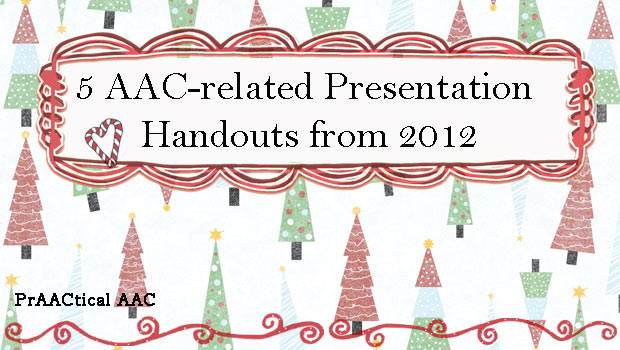
One of our deepest holiday wishes is that every AAC-loving clinician could have an increased travel budget for professional development. Until then, here are some handouts from AAC presentations at conferences around the US. From the ISAAC Biennial Conference in Pittsburgh: Effects of Early AAC Intervention for Children with Down Syndrome by Janice Light and Kathryn Drager This was a well-attended session by Jane Korsten & Terry Foss at ISAAC 2012: Assessment Strategies for Individuals with Sensorimotor Differences Wish I could have been at Deanna Wagner’s session at ARSHA on AAC for Students with Visual and Multiple Disabilities: How to Plan and Implement a Successful AAC Treatment of Childhood Apraxia of Speech: A Checklist for Evidence-based Practice by Sue Caspari at the 2012 ASHA Schools Conference Theresa Bartolotta & Patricia Remshifski’s ASHA session on Communication & Swallowing in Rett Syndrome: An Update for Clinicians
December 7, 2012
by Carole Zangari -

Last month, we talked a lot about semantic intervention with people who are learning AAC. Once we got started, we realized we could have done another whole month on the topic, but we had to move on. We ran out of time before we could really talk about outcome measures. As clinicians, how do we determine whether our therapy is effective? Here are some things to do after you’ve provided high-quality, well-sequenced vocabulary instruction. Make small comprehension checks a regular part of your instruction. Ask the AAC learner to tell you about ___ . Then score their response as objectively as possible (e.g., complete & correct, correct but incomplete, vague, incorrect). You’ll get some real-time feedback and can clarify or re-teach as necessary. Assess in a standardized fashion. Standardized means doing something the same way each time. Set up appropriate assessment tasks that allow you to judge how well the... [Read More...]
November 29, 2012
by Carole Zangari -
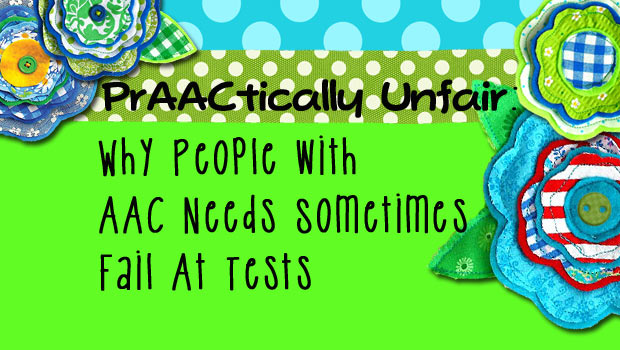
What do these situations have in common? Renting a car with a new GPS system to drive to an interview in a foreign city Hosting a dinner party and cooking a gourmet meal in someone else’s kitchen Using new software to deliver a presentation at a conference If you said they all create anxiety, you’re right. But here’s something else: They all require you to do something unfamiliar or difficult and learn a new tool at the same time and produce results under stressful conditions. We would never put our AAC learners under such stress and expect them to perform well, would we? Of course not! Except when we: Ask them to use an AAC device/app that they are still learning to answer test questions Require them to use a new or exhausting motor pattern to produce a written product for grading Expect students without sufficient test-taking skills to demonstrate... [Read More...]
November 23, 2012
by Carole Zangari -

When we’re writing AAC evaluation reports, compiling funding documents, and summarizing the present level of performance in IEPs, we frequently comment on speech intelligibility. In some cases, we’ve administered a standardized assessment instrument and are sharing those results. Often, though, the comments are more descriptive in nature. It is not uncommon to read documentation in which someone with articulation difficulties is described as having speech intelligibility that is mildly, moderately, or severely impaired. Those categories are pretty broad, open to interpretation, and can be quite vague. What do we really mean when saying that someone does or doesn’t have intelligible speech? To narrow down the meaning, we specify the two variables that have the greatest influence on how comprehensible the communicator’s speech output actually is: the context and the communication partner. Specifying whether the context is known and the partner is a familiar one, helps us better interpret the descriptors... [Read More...]
November 17, 2012
by Carole Zangari -
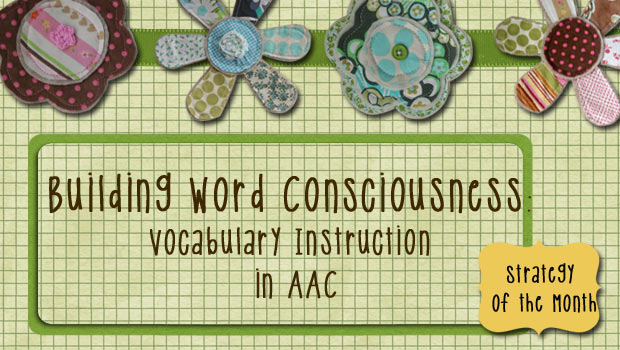
The mind is not a vessel to be filled but a fire to be kindled. Plutarch Last week, Robin discussed some strategies and activities for teaching new words to individuals who are at the earlier stages of language learning. This week, we move ahead and address semantic instruction for individuals who regularly create sentences to express themselves. One of my favorite things about working with AAC learners at this level is the opportunity for having metalinguistic conversations. Getting them to think and talk about language can accelerate their learning. Here are some prAACtical thoughts on how this relates to semantics with a focus on building word consciousness. We’re all familiar with music appreciation and art appreciation. I always think of word consciousness as a sort of like word appreciation. It refers to an awareness that words are the building blocks of language and that they can be examined and manipulated... [Read More...]
November 7, 2012
by Carole Zangari -
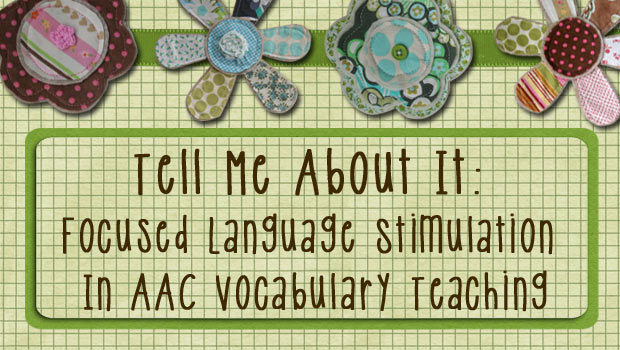
Earlier this month, we introduced a general sequence of how we conceptualize semantic instruction. We promised to elaborate on that. There are two things that I really love about this approach to to vocabulary teaching. The first is that is honors a principle that we know to be true: providing repetition with variety not only helps us reach learners with different strengths, but also gives our AAC learners much-needed practice. The other thing that makes this really work for us is that assessment has an active role but not a central one. Testing takes a backseat to teaching. As we all know, getting accurate assessment information from people who are learning their AAC systems is a huge challenge. Often, our AAC friends don’t have decent test-taking skills so we’re not really testing what we think we’re testing. Just last week I got to see Kristofer, an adorable little fellow who... [Read More...]
November 3, 2012
by Carole Zangari -
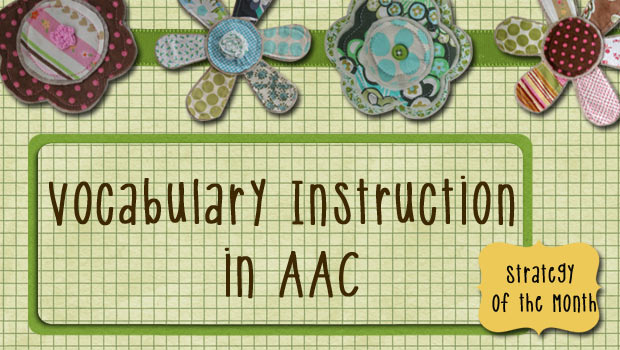
For all of us, the process of how we learn to use words begins with the expression of our own intents. Initially, we use words, pictures, or signs to make our wants/needs known but that soon develops into social exchanges, true conversations, stories, and more. For some of our AAC friends, the path to a rich lexicon can be convoluted and bumpy. Our November Strategy of the Month posts will focus on vocabulary instruction giving both general principles that should guide our teaching and specific considerations for communicators at different levels. As SLPs, we should be champions for a comprehensive approach to semantic instruction in AAC. Much of what we already know for teaching semantics to people who speak can be applied quite nicely to individuals with AAC needs. Certainly some things will need to be adapted, but that’s not the real issue. We’ve noticed that SLPs sometimes forget to... [Read More...]
October 28, 2012
by Carole Zangari -

We mean well. We really do. But sometimes the things we say or do, and even the things we DON’T say/do have a negative impact on our long-range goal of improving AAC outcomes. Here are some of the things we’ve observed that can discourage AAC use. Recommending AAC without giving stakeholders a solid, evidence-based rationale creates a shaky foundation. People aren’t going to put forth effort to implement something they don’t believe in, and they won’t believe in it until we make a compelling, well-supported argument. ‘Rules that aren’t understood are the first to be broken.’ It’s easy to forget that, in some ways, the AAC user is learning a whole new language. What would it take US to learn a new language? Well, for starters, we’d want to be immersed into an environment with competent speakers of that language. Hearing the language that we’re trying to learn makes... [Read More...]
October 11, 2012
by Carole Zangari -
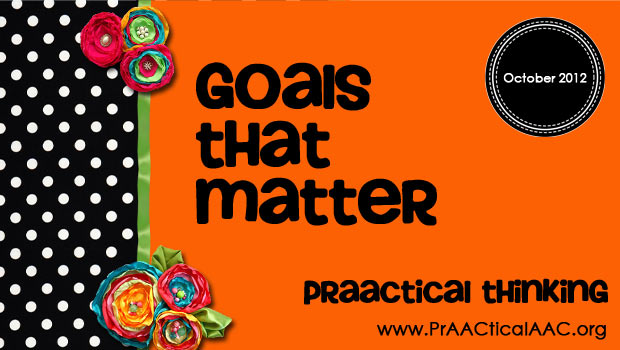
Like some of you, we often get asked “The Question.” People sometimes ask us to give them a recommendation about what AAC device or app is best for a particular individual. When the question comes from a parent or therapist whom we don’t know, it’s understandable. But when it is from a clinician we’ve taught, (who should know better), it’s a bit baffling. Obviously, we’d never make that kind of recommendation without having done an evaluation, or at least reviewing someone else’s assessment. We dread “The Question.” On the other hand, there are a lot of things that we wish people would ask that relate to how to help the communicator develop strong skills. This post relates to to one of those type of questions. “What should I work on?” “What kinds of AAC goals should we write?” We like those kinds of questions and our answers generally have one... [Read More...]
October 8, 2012
by Carole Zangari -
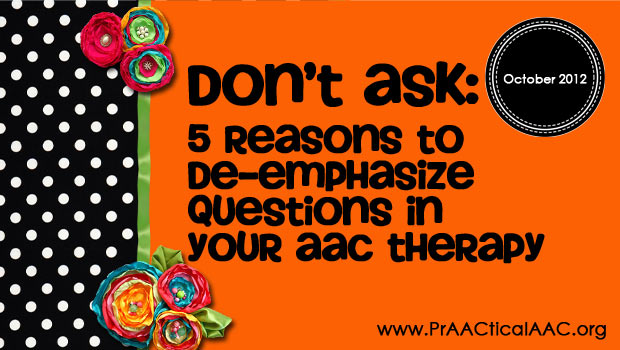
Questions are more like assessment than they are like instruction. Don’t believe us? Look at the questions these therapists posed and see if you didn’t feel like you were being quizzed. What’s your name? Where do you live? Do you know your address? How old are you? When’s your birthday? What school do you go to? What’s your teacher’s name? What’s that called? What do we do with that? Can you tell me more about it? Just to be clear, we think data-based decision-making always plays an important role in good therapy. However, assessment is assessment. Assessment helps us figure out what to teach and how to teach it. But it should look and sound very different than instruction. So when the SLP tells us she is going to teach a new skill by asking a question, we start to tense up. Here’s why we’re de-emphasizing questions in our AAC... [Read More...]









